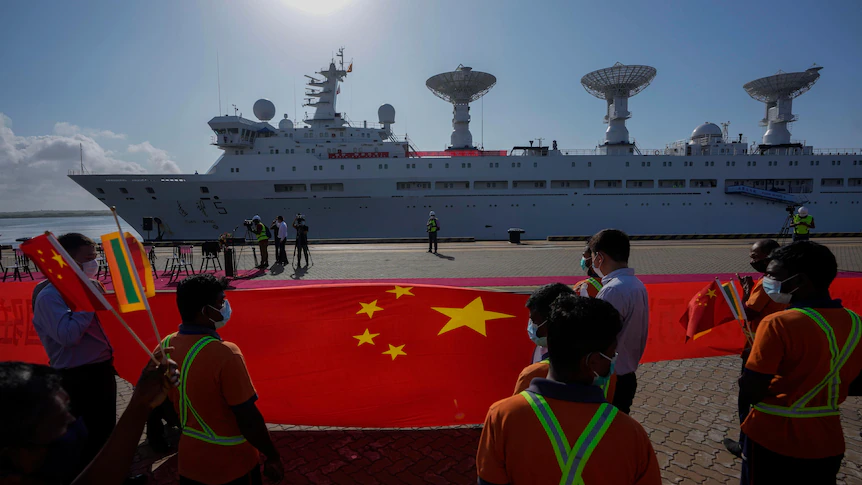China’s unswerving manoeuvre to dock the Yuan Wang 5, missile and satellite tracking ship at Hambantota port in Sri Lanka despite the country’s request to defer the visit of the ship amid security concerns raised by India and the United States might seem like a victory for Beijing in this strategically important island nation but in fact, it reinforces the image of China as a predatory imperial power that is trying to exploit Sri Lanka for its own purposes, a media report said.
The Yuan Wang 5, China’s missile and satellite tracking ship which had berthed at Hambantota port in Sri Lanka departed on Monday.
There were grave concerns that the ship could conduct satellite research in the northwestern part of the Indian Ocean region, prompting security concerns from India.
India had expressed its security concerns over the docking of the vessel at the Sri Lankan port as it was touted as a research vessel with the capability of mapping the ocean bed, which is critical to the anti-submarine operations of the Chinese Navy.
However, China claimed that the docking of its Yuan Wang 5 ship at Hambantota port in Sri Lanka does not affect any country and termed it a normal exchange between the two countries.
Sri Lanka’s Foreign Affairs Minister confirmed that the Chinese vessel ‘Yuan Wang-5’, widely believed to be a spy ship, has been given clearance to arrive at Hambantota Port on August 16.
“Having considered all material in place, on 13 August 2022, the clearance to the Embassy of the People’s Republic of China was conveyed for the deferred arrival of the vessel from 16-22 August 2022,” Foreign Affairs Ministry said in a statement.
Giving details about the process, the foreign affairs ministry said that they were informed by China via a diplomatic note on June 28 regarding Yuan Wang 5 arrival.
The Sri Lankan government was requested to provide necessary assistance and positive consideration to the request by the Embassy of the People’s Republic of China.
China’s strategy to lure countries into its debt trap beguiled Sri Lanka to be dependent heavily on China for economic support, and military equipment. Sri Lanka also took loans in bulk for various development projects.
But during the recent crisis in the country, when for months, Sri Lanka has been pleading with China for more support, but to no avail, Channel News Asia reported.
Beijing has done little to help the country through its devastating economic meltdown, providing far less aid than India.
India moved in to alleviate Sri Lanka’s desperate food and fuel shortages with over USD 3.8 billion of assistance. Beijing, by contrast, provided a relatively paltry USD 74 million.
While India extended a currency swap arrangement with Sri Lanka in April, the People’s Bank of China has suspended its own swap line because the country lacks sufficient foreign exchange reserves.
China has also expressed a reluctance to write off its Sri Lankan loans, playing into accusations of stinginess when it comes to debt renegotiations. Indeed, China’s record in this area shows a refusal to negotiate debt relief with other creditors and a preference for engaging in secretive, bilateral loan restructurings.
Quite why China would sit back and allow an adversary to reap the soft power benefits of this current crisis is baffling when it has often been blamed by the US government and others for causing Sri Lanka’s problems and could use an opportunity to improve its reputation on the island.
China held clout over Sri Lanka during the presidency of Mahinda Rajapaksa from 2005 to 2015, then it lost ground under his successor; but regained influence when Mahinda’s brother, Gotabaya, took the helm in 2019.
Now the tables have turned once again. Gotabaya and his brother both resigned from the government this year, depriving China of its best friends in Colombo.
It has long been claimed that Beijing engages in “debt trap diplomacy”, swamping poor countries with so much debt that they cannot pay back their loans and must surrender control of strategic assets, enabling China to expand its geopolitical influence under the guise of seemingly benign infrastructure projects.
The Hambantota port is an example of the same, where the Chinese People’s Liberation Army (PLA) vessel has docked.
The project was financed by Chinese loans, but in 2017, Beijing allegedly seized the port when Sri Lanka could not service its debt, following which the port was handed over to the Chinese on a 99-year lease.
China supposedly grabbed Hambantota because it wanted to establish a naval base along strategic shipping lanes.
Beijing has been happier extending new loans than writing off old ones, thus fulfilling a role akin to that of the International Monetary Fund, which provides cash-strapped countries with emergency financing, Channel News Asia reported.
But in many of these cases, liquidity is not the problem; solvency is. And what countries really need from China is a reduction in their debt load, not more credit.
Recently, China has reached a deal with Zambia’s other creditors to provide some form of debt relief as part of a multilateral G20 initiative. But the details of this agreement remain unclear and it is too soon to say that Beijing has softened its approach.
While China has been blamed unfairly for its role in the island’s crisis, its handling of the situation has so far been clumsy and self-destructive. If Beijing doesn’t mend its ways, it could experience setbacks in other indebted countries, too.

